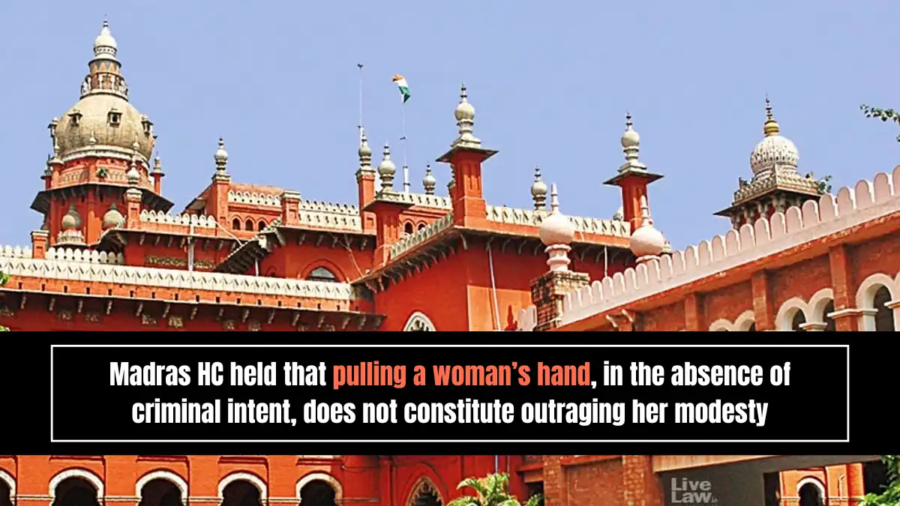Pulling Woman’s Hand Without Criminal Intent Doesn’t Outrage Her Modesty: Madras High Court
Facts of the Case:
The Appellant was convicted by the trial court under Section 354 of the Indian Penal Code. The prosecution alleged that the victim, an unmarried mentally challenged woman belonging to a Scheduled Caste, was grazing cattle when the Appellant abused her and pulled her hands. Subsequently, the victim’s mother lodged a complaint. After trial, the Appellant was acquitted under Sections 3(1)(x) and 3(1)(xi) of the SC/ST (Prevention of Atrocities) Act, 1989, but convicted under Section 354 IPC.
Contention of the Appellant:
According to the Appellant, there was no substantive evidence to establish that he had abused the victim or pulled her hands with the intent to outrage her modesty. The appellant further submitted that the only claimed eyewitness gave contradictory statements, inconsistent with the complaint, and the victim herself was not examined. The trial court, it was submitted, failed to extend the benefit of doubt in light of these inconsistencies. The appellant further contended that even if the alleged act of pulling the victim’s hands had occurred, it would not, in itself, amount to outraging her modesty without proof of the requisite intention.
Contention of the Respondent:
The prosecution contended that the victim’s disability prevented her examination, and the trial court had rightly relied on the testimony of the eyewitness, whose evidence was sufficient to prove the charge. It was argued that the trial court had properly appreciated both oral and documentary evidence before convicting the accused, and no interference was warranted.
Court’s observations:
The Court found that the eyewitnesses statements were vague and generalised, making it difficult to infer the accused’s intention. These contradictions, coupled with the absence of corroboration from other witnesses, weakened the prosecution’s case. Referring to the Supreme Court’s ruling in Naresh Aneja @ Naresh Kumar Aneja v. State of Uttar Pradesh (2025), the Court emphasised that Section 354 IPC requires not just physical contact but a proven intention to outrage the modesty of a woman. Vague and generalised statements, without clear evidence of such intention, could not sustain a conviction.
The Court observed:
“Though pulling the hands of a woman by a man would throw shock to the sense of decency of a woman, that should be coupled with the criminal intention of the accused. If the accused had any other intention like pulling the victim away from the center of a road or to assert any other accident that cannot be considered as commission of an offence of outraging the modesty without a detailed and clear evidence about the intention, it can be presumed automatically from any generalized or vague statements given in the evidence.”
Court’s order:
The Court held that the appellant was entitled to the benefit of doubt. Accordingly, the Appeal was allowed. The conviction and sentence under Section 354 IPC were set aside, and the appellant was acquitted of all charges.
Written by Adv. Prerna Murarka



